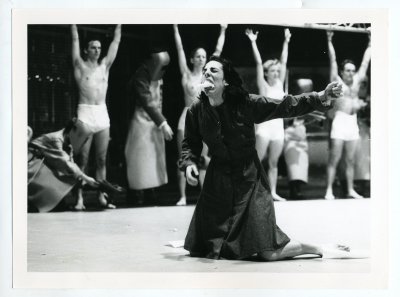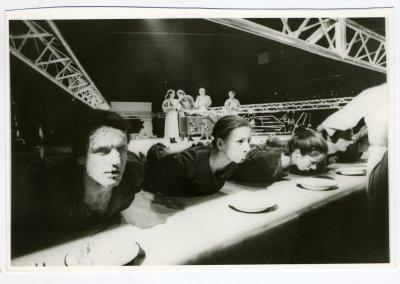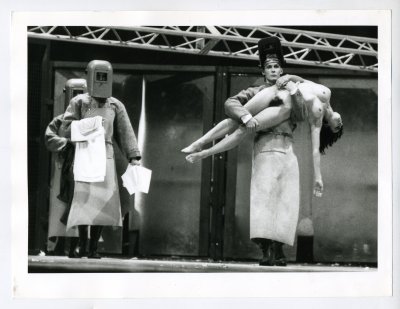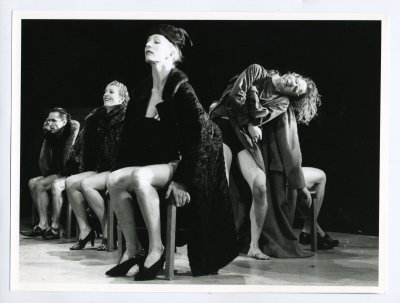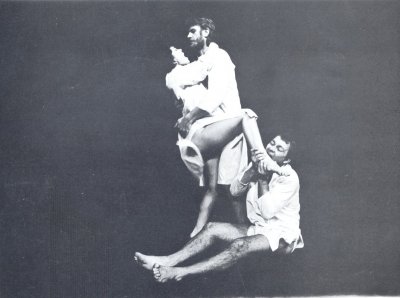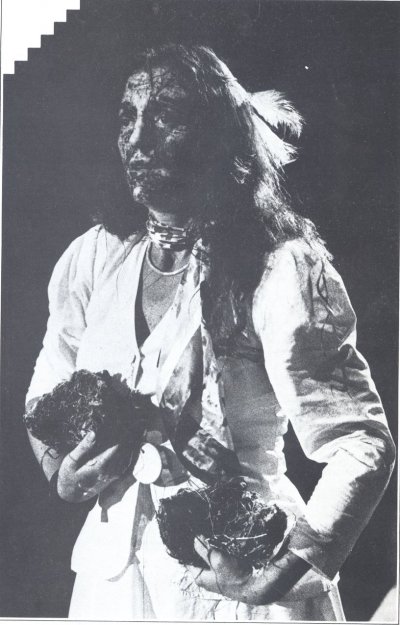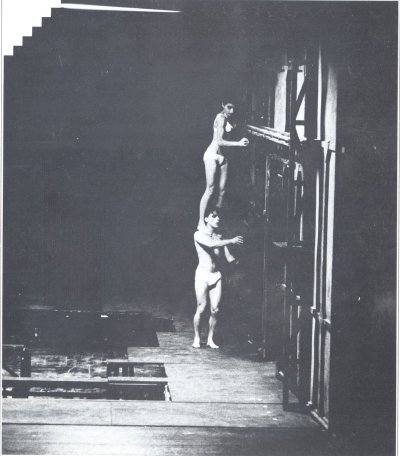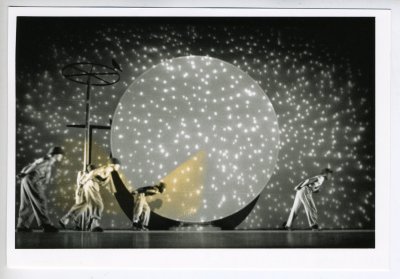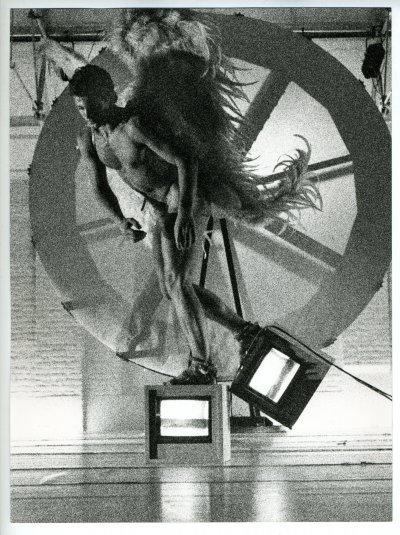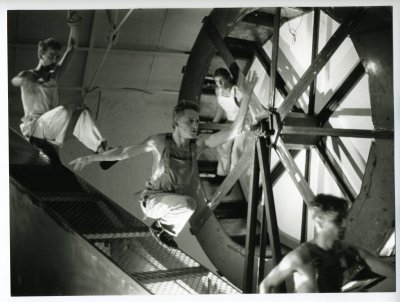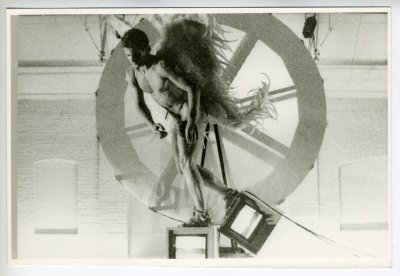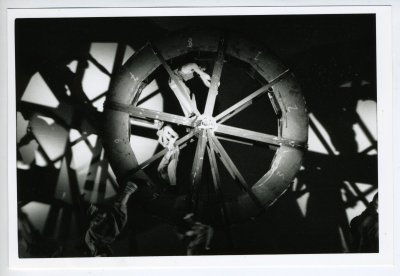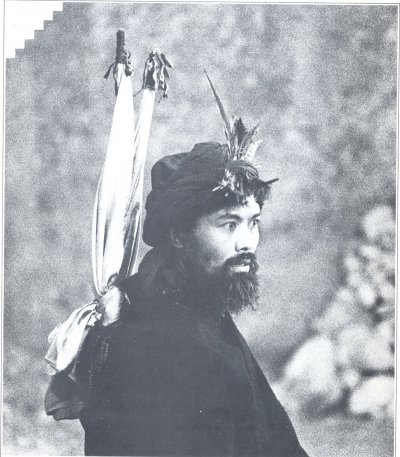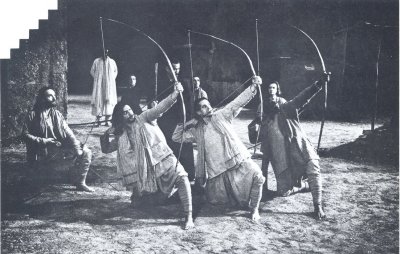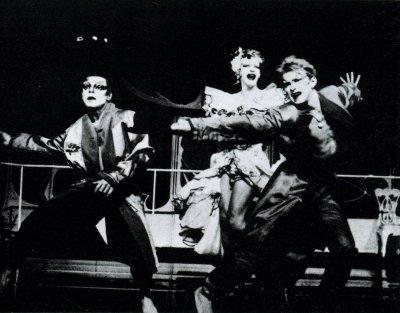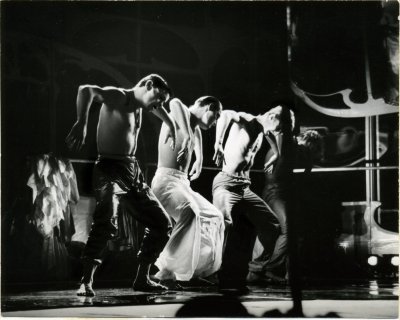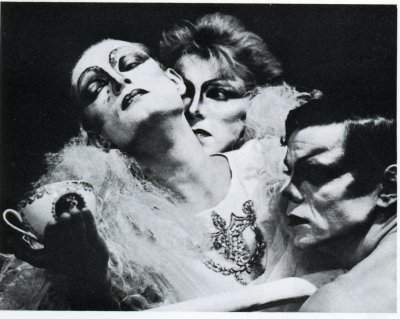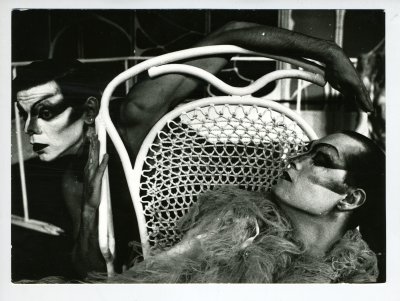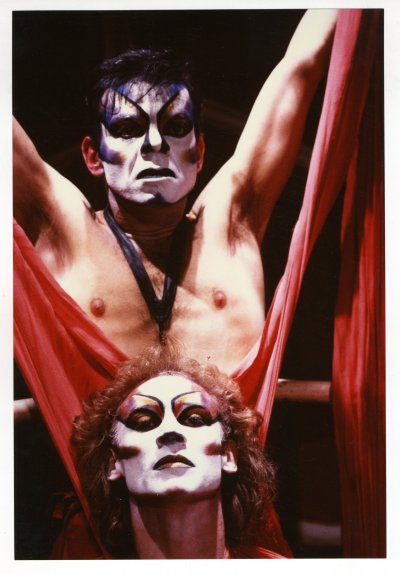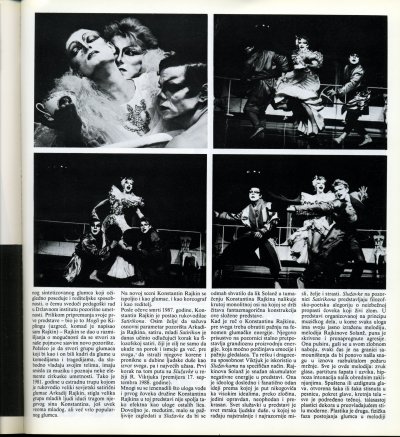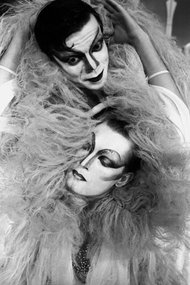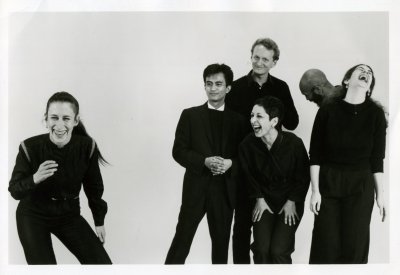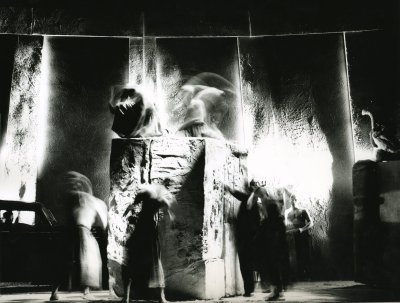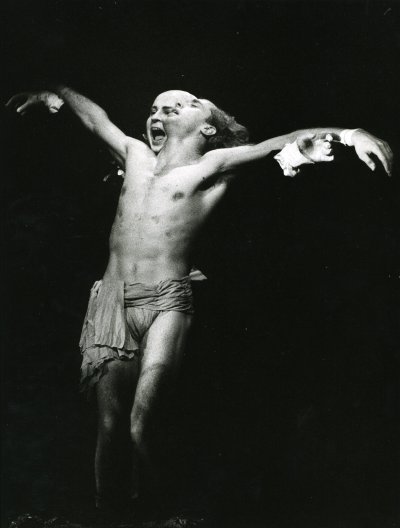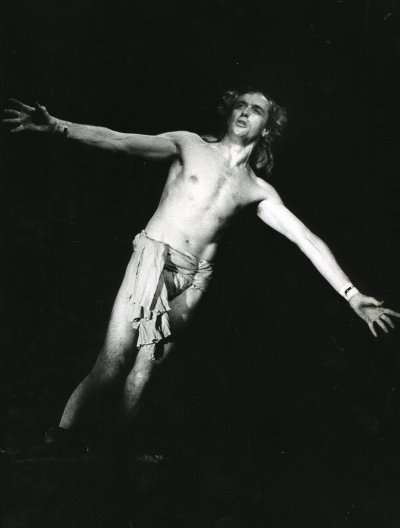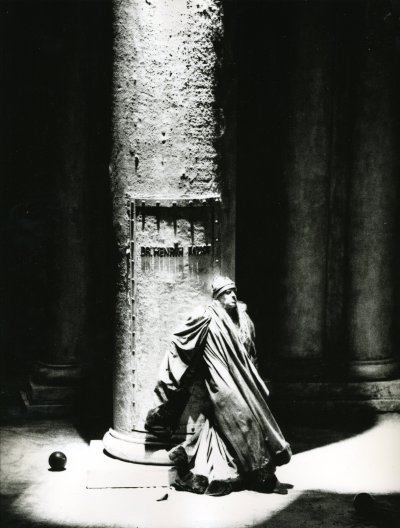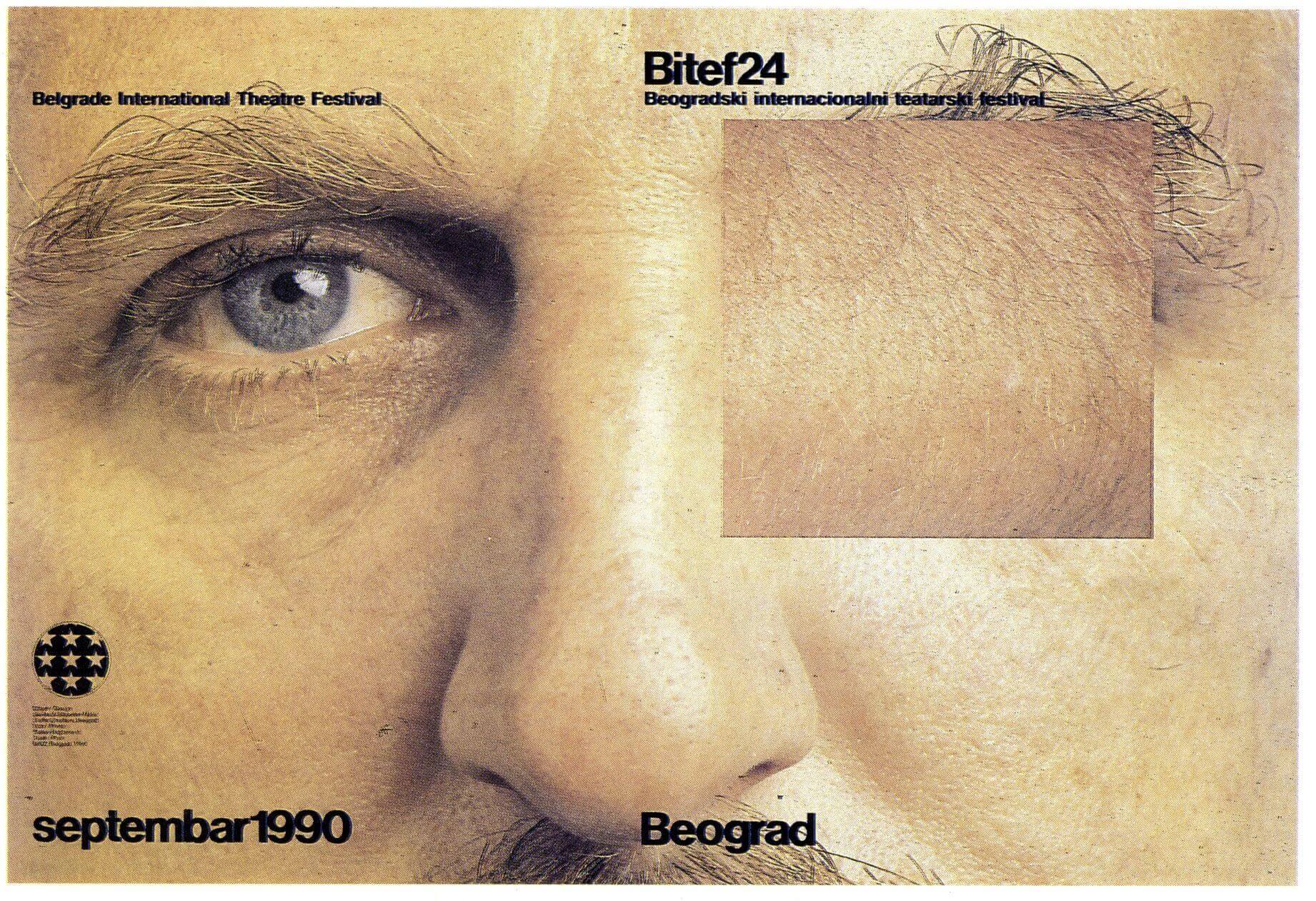
Dizajn / Design: Saveta Mašić / Slobodan Mašić (1939-2016)
TEATAR I PARATEATAR
U savremenom životu sve smo više navikli na neobične reči, kao što su parapsihologija, paramedicina, paralogizam i druge, koje se rađaju iz dana u dan. Ta čarobna reč „para-“ koja menja ustaljene pojmove nauke i života zapravo je grčki predlog veoma širokog spektra, koji u složenicama označava pogrešku, prekoračenje, suprotnost, preobražaj.
I kao što parapsihologija i paramedicina proučavaju oblasti izvan klasične sfere tih nauka, tako bi parateatar bio onaj oblik teatra koji je izvan uobičajenih formi teatra, koji prekoračuje njegove dosadašnje sfere, preobražava ih i katkada je u suprotnosti s njima. Kako je počela avantura avangardnog pozorišta u našem veku, svaka ta novina bila je prekoračenje u odnosu na dotadašnje pozorište. Od svog osnivanja, 1967. godine, BITEF je većinom svojih predstava prikazivao razne oblike preobražaja savremenog pozorišta, a samim tim, u ekstremnim slučajevima prikazivao je zapravo parateatarske pojave u odnosu na teatar svoga vremena.
Poslednjih sezona parateatarske predstave sve više osvajaju svetske scene i postaju omiljen oblik pozorišnog izražavanja i sve su omiljenije i kod publike. Parateatrom se bave ne samo male eksperimentalne trupe već taj oblik pozorišta osvaja i velike scene Evrope i sveta, a njime se bave ne samo mladi koji tragaju, već se parateatarskim elementima obilato služe i velika rediteljska imena našeg vremena.
Da bismo ovu sliku savremenog pozorišta preveli na jednostavniji jezik, možemo reći da se teatar, osim rečju, sve više služi najrazličitijim oblicima stilizovanog pokreta, pantomimom, borilačkim i cirkuskim veštinama, elementima lutkarskog pozorišta, drevnim ritualima i muzikom kakve donedavno nije bilo u teatru.
Uporedo s tim, klasični oblici drugih umetnosti, opera, balet, pantomima, muzički koncert ili rok koncert, služe se elementima drugih umetnosti. Iz tog preplitanja svih elemenata scenskog i umetničkog izražavanja, kad se čini da je sve dozvoljeno, nastaje umetnost koja se može nazvati parateatrom. Naravno, sve je dozvoljeno ako je plod umetnost. Koji su kriterijumi te nove umetnosti, na to može odgovoriti samo praksa umetnosti današnjeg trenutka. Zapravo, uvek se rađala nova umetnost koja teško podleže definiciji i čovečanstvo je bilo u stalnoj potrazi za smislom, vrednošću, stilom, značenjima te novorođene umetnosti do tada nepoznate svetu. Isti je slučaj s teatrom i parateatrom ove, 1990. godine, na kraju jednog veka i na pragu novog milenija.
Podnaslov ovogodišnjeg BITEFA je Teatar i parateatar, jer ni parateatar se ne pojavljuje u svom čistom obliku; on je uvek spoj starog i novog, poznatog i nepoznatog, teatra jučerašnjice i teatra sutrašnjice.
U trenutku kad se pred nama odigrava istorija, a naša uža sredina, Jugoslavija, Srbija i Beograd, u njima učestvuju na neposredan način, mnogi se pitaju šta u tom burnom pejzažu traži parateatar. Odgovor se ne može naći u današnjem danu, već samo u istorijskom iskustvu. Ovi prostori prolazili su mnoge burne događaje, velike materijalne teškoće i žrtve, pa je uvek i u najtežim okolnostima umetnost krčila svoj put i nagoveštavala, slutila bolja vremena. Uveren sam da i ovogodišnji BITEF nagoveštava, čak i gradi ta bolja vremena.
Jovan Ćirilov
THE THEATRE AND PARA-THEATRE
In the world of contemporary realities, we are becoming increasingly aware of such unusual words as para-psychology, para-medicine, or para-logic, words which seem to spring up like mushrooms with each new day. That magical prefix which changes the usual notions of life and science, that para is, in fact, a Greek preposition with rather broad meaning, signifying, in compound-words, an error, transgression, opposition, transformation…
In a manner similar to that of para-psychology and para-medicine, which deal with notions beyond the classical domains of their respective sciences, the para-theatre functions as an error in the body of the present-day theatre, as a transgression against, or an opposition to, its usual forms, and perhaps a transformation of the theatre. Since 1967, when it was founded, the BITEF festival has shown, in a great majority of performances, various symptoms of that transformation of contemporary theatre. In certain more extreme cases, the Festival has even shown performances which were practually para-theatrical in relation to the theatre of their time.
In the last couple of seasons, para-theatrical productions have taken over the stages of the world and become a favoured form of theatrical expression. The audiences seem to like it, too. The para-theatre is no longer bound with small experimental troupes; it has already invaded the big halls. Furthermore, it is not only the young who seek and search within the boundaries of the para-theatre, but there are elements of it even in the works of the most reputed theatre directors of our time.
In order to give at least a vague picture of what para-theatre is all about, we could say that it is a theatre which abandons the (spoken) word in favour of increasingly more stylized bodily movement – be it dance, pantomime, martial or gymnastic skills, or the use of the elements of the puppet theatre, ancient rituals and music unheard of in the theatre of our day. On the other side, the classical forms of other arts – opera, ballet, music – assume the elements of showmanship seen only at rock concerts. This interaction of all the elements of scenic expression, at a time when anything goes, gives rise to an art which we may call para-theatre.
Naturally, anything goes only if the final outcome is the art. What are the criteria of the new art? That is the question that only the ongoing practice of that art can answer. In fact, it has always been so: whenever a new art was being born, the people would search for a definition of it, in hope of determining the sense, the value, and the meaning of the new-born art. The same seems to be the case with theatre and para-theatre in this year of 1990, at the end of a century and the beginning of a new millennium. We have subtitled this year’s BITEF festival the Theatre and Para-Theatre for, as long as the para–theatre remains a mixture of the old and new, the known and unknown, the theatre of yesterday and the theatre of tomorrow, it will not possess any clearly definable form.
At a time when we watch the history happen before our eyes, and when our own imminent surroundings Yugoslavia, Serbia, Belgrade – take part in it in most direct ways, many people will ask themselves what is the sense of having a festival of para-theatre amidst all this mess.
The answer can not only be sought in what is going on today but also in what was happening before, in our historic experience. These countries have passed through many tumultuous events, through great devastation and sacrifice, but even in the hardest of times the art pushed its way through, predicting, or at least hinting at, better times. I am convinced that this year’s BITEF festival not only foreshadows but actually creates such better times.
Jovan Ćirilov
Glavni program / Main programme
354 Plan K (Brisel, Belgija); Frederik Flamand: Ikarov pad; režija: Frederik Flamand (Grand Prix Мira Trailović) / Plan K (Brusells, Belgium); Frédéric Flamand: La chute d’Icare (The Fall of Icarus); direction: Frédéric Flamand (Grand Prix Мira Trailović)
355 Théâtre du Point Aveugle (Мarselj, Francuska); Fransoa-Мišel Pesenti: Boravak; režija: Fransoa-Мišel Pesenti / Théâtre du Point Aveugle (Мarseille, France); François-Michel Pesenti: Le séjour; direction: François-Мichel Pesenti
356 BITEF teatar (Beograd, Jugoslavija); Federiko Garsija Lorka: Dom Bernarde Albe; režija i koreografija: Dejan Pajović / BITEF Theatre (Belgrade, Yugoslavia); Federico García Lorca: La Casa de Bernarda Alba (The House of Bernarda Alba); choreography and direction: Dejan Pajović
357 Odin Teatret (Holstebro, Danska); Euđenio Barba: Talabot; režija: Euđenio Barba / Odin Teatret (Holstebro, Denmark); Eugenio Barba: Talabot; direction: Eugenio Barba
358 Slovenské komorné divadlo SDK (Martin, Češka i Slovačka Federativna Republika); Pjer de Мarivo: Dodir i sporovi; režija: Roman Polak / The Slovak Chamber Theatre in Martin (Czech and Slovak Federative Republic); Pierre de Marivaux: Dotyky a spojenia / Spor (A Matter of Dispute / La Dispute); direction: Roman Polák
359 Bremer Theater (Bremen, Savezna Republika Nemačka); Johan Kresnik: Ulrike Мeinhof; režija i koreografija: Johan Kresnik / Bremer Theater (Bremen, Federal Republic of Germany); Johann Kresnik: Ulrike Мeinhof; choreography and direction: Johann Kresnik
360 Slovensko narodno gledališče (Мaribor, Jugoslavija); J. V. Gete: Faust; režija: Tomaž Pandur (Grand Prix Мira Trailović) / Slovenian National Theatre (Мaribor, Yugoslavia); J. W. Goethe: Faust; direction: Tomaž Pandur (Grand Prix Мira Trailović)
361 Мeredith Мonk and Vocal Ensemble (Njujork, Sjedinjene Američke Države); Knjiga dana: Koncert; muzika: Мeredit Мonk / Мeredith Мonk and Vocal Ensemble (New York, United States of America); Book of Days: Concert; Music: Мeredith Мonk
362 The Bow Gamelan (London, Velika Britanija); Zvučna događanja; koncept i dizajn: Pol Barvel, Bet Hardisti / The Bow Gamelan (London, United Kingdom); Sound Events; concept and design: Paul Burwell, Beth Hardisty
363 Российский государственный театр “Сатирикон,, имени Аркадия Райкина (Мoskva, Savez Sovjetskih Socijalističkih Republika); Žan Žene: Sluškinje; režija: Roman Viktjuk (Specijalna nagrada, Nagrada publike) / Raikin Satyricon Theatre (Мoscow, The Union of Soviet Socialist Republics); Jean Genet: Служанки (Les Bonnes / The Maids); direction: Рома́н Григо́рьевич Виктю́к / Роман Григорович Віктюк (Roman Grigoryevich Viktyuk); (Special Award, Audience Award)
364 Film: Мahabharata – po komadu Žan-Klod Kariera; režija: Piter Bruk / Film: Мahabharata (देवनागरी) – based on a piece by Jean-Claude Carrièrea; direction: Peter Brook
Your Content Goes Here
